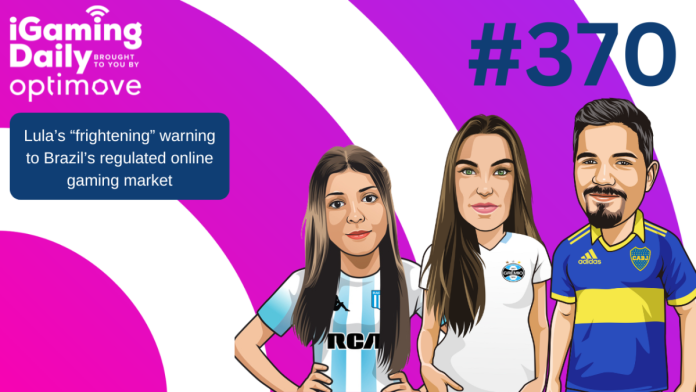It was all about Brazil on the latest episode of iGaming Daily. Fernando Noodt, Senior Journalist for SBC Noticias, was joined by SBC Noticias’ Editor, Lucía Gando, and Isadora Marcante, SBC’s Relationship Manager – Brazil, to discuss the latest updates from the region.
On 6 October, ahead of the launch of the country’s regulated online gaming market, President Lula put out a “frightening” warning that he will end online betting and gaming in the country if new regulations fail to achieve the results expected by the government.
On the President’s message, Isadora said: “It’s really hard to understand these movements because this generates so much insecurity for operators, especially the international operators.
“We are seeing some bills going to Congress asking to ban every kind of sponsorship and advertising on sports betting and if this passes, for example, will the international operators continue in Brazil? Because when they signed up for it, they didn’t know that this was going to happen or could happen.
“We are seeing the majority of the population in Brazil saying that sports betting should be banned because it’s something that could cause addiction and it’s horrible because we don’t have education on it and people don’t see sports betting as entertainment. We don’t know what the government is saying, but [it could be] pressure from the general public that they feel they need to answer.”
96 companies have gained authorisation for 111 brands to operate across the territory, however, according to the trio, it is unlikely that this list will remain so long.
“In the long run I feel like there are not going to be so many brands,” explained Lucia.
“I think probably most of them will be merged with another company or acquired by another company like what’s happening with Betmais and Casa de Apostas. These are two quite well-known companies in Brazil and right now, Betmais is part of Casa de Apostas as they have this commercial agreement in place.”
As part of the effort to regulate the industry, the Brazilian government is also planning to block unauthorised operators.
To end the episode, the attention switched to Argentina where the state of Mendoza has announced that, as of 2025, 25% of what is collected at the provincial level from gambling and betting will be allocated to mental health and addiction programmes.
Additionally, San Juan is pushing to become the latest Argentinian region to establish a regulated igaming and sports betting market.
“The local gaming regulator presented a project to include igaming and sports betting among the legalised offerings,” said Lucía.
“They will work with successful regulations that are currently implemented in Mendoza and both Buenos Aires city and the province to develop a similar framework. Even though the government is not 100% pro-gambling, they consider that regulation is the only way to address illegal gaming, especially among underage players.”





